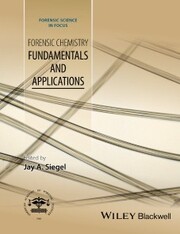Detailansicht
Forensic Chemistry
eBook - Fundamentals and Applications, Forensic Science in Focus
ISBN/EAN: 9781118897737
Umbreit-Nr.: 8698547
Sprache:
Englisch
Umfang: 541 S., 26.82 MB
Format in cm:
Einband:
Keine Angabe
Erschienen am 05.10.2015
Auflage: 1/2015
E-Book
Format: PDF
DRM: Adobe DRM
- Zusatztext
- <p><i>Forensic Chemistry: Fundamentals and Applications</i>presents a new approach to the study of applications of chemistry to forensic science. It is edited by one of the leading forensic scientists with each chapter written by international experts specializing in their respective fields, and presents the applications of chemistry, especially analytical chemistry, to various topics that make up the forensic scientists toolkit.</p><p>This comprehensive, textbook includes in-depth coverage of the major topics in forensic chemistry including: illicit drugs, fibers, fire and explosive residues, soils, glass and paints, the chemistry of fingerprint recovery on porous surfaces, the chemistry of firearms analysis, as well as two chapters on the key tools of forensic science, microscopy and chemometrics. Each topic is explored at an advanced college level, with an emphasis, throughout the text, on the use of chemical tools in evidence analysis.</p><p><i>Forensic Chemistry: Fundamentals and Applications</i> is essential reading for advanced students of forensic science and analytical chemistry, as well as forensic science practitioners, researchers and faculty, and anyone who wants to learn about the fascinating subject of forensic chemistry in some depth.</p><p>This book is published as part of the AAFS series 'Forensic Science in Focus'.</p>
- Kurztext
- Forensic Chemistry: Fundamentals and Applications presents a new approach to the study of applications of chemistry to forensic science. It is edited by one of the leading forensic scientists with each chapter written by international experts specializing in their respective fields, and presents the applications of chemistry, especially analytical chemistry, to various topics that make up the forensic scientists toolkit. This comprehensive, textbook includes in-depth coverage of the major topics in forensic chemistry including: illicit drugs, fibers, fire and explosive residues, soils, glass and paints, the chemistry of fingerprint recovery on porous surfaces, the chemistry of firearms analysis, as well as two chapters on the key tools of forensic science, microscopy and chemometrics. Each topic is explored at an advanced college level, with an emphasis, throughout the text, on the use of chemical tools in evidence analysis. Forensic Chemistry: Fundamentals and Applications is essential reading for advanced students of forensic science and analytical chemistry, as well as forensic science practitioners, researchers and faculty, and anyone who wants to learn about the fascinating subject of forensic chemistry in some depth. This book is published as part of the AAFS series 'Forensic Science in Focus'.
- Autorenportrait
- <p><b>Jay Siegel, Emeritus Professor of Forensic Science, Michigan State University</b><br />Jay Siegel is Director of the Forensic and Investigative Sciences Program at Indiana University Purdue University, Indianapolis and Chair of the Department of Chemistry and Chemical Biology. He holds a Ph.D. in Analytical Chemistry from George Washington University. He worked for 3 years at the Virginia Bureau of Forensic Sciences, analyzing drugs, fire residues and trace evidence. From 1980 to 2004 he was professor of forensic chemistry and Director of the forensic science program at Michigan State University in the School of Criminal Justice.<br />He is Editor in Chief of the<i>Encyclopedia of Forensic Sciences</i>, author of<i>Forensic Science: A Beginner's Guide and Fundamentals of Forensic Science</i> and has over 30 publications in forensic science journals. Dr. Siegel was awarded the 2005 Paul Kirk Award for lifetime achievement in forensic science. In February 2009, he was named Distinguished Fellow by the American Academy of Forensic Sciences. In April 2009 he was named the Distinguished Alumni Scholar Award by his alma mater, George Washington University.</p>
